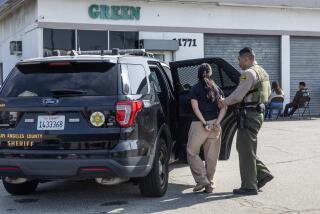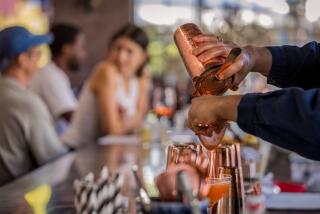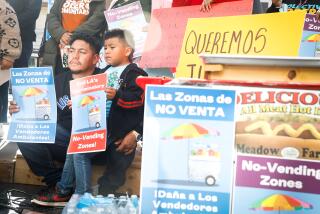Number of Stores Nearly Doubles in 10 Years : South Gate Studies Liquor Sale Controls
- Share via
SOUTH GATE — The Planning Commission will hold a public hearing Tuesday to consider a series of recommendations aimed at controlling the rapid growth of liquor-selling establishments here.
A staff report submitted to the commission says that the number of liquor establishments citywide has nearly doubled in the last decade and now totals 130--about one for every 525 people in the 75,000-resident community.
While some neighboring communities have more businesses that sell liquor per capita, it is the concentration of the establishments within South Gate’s commercial areas that is the real problem, said Felix J. Reliford, a city planning aide. He said most of the establishments are on seven commercial streets.
‘Long Past Due’
In addition, the report said that a police undercover operation this summer cited more than half the 130 businesses for selling alcohol to minors.
The efforts to restrict alcohol consumption in the city are “long past due,” said Planning Commissioner John R. Linton. He said the numbers of people applying for liquor licenses “just seem to multiply.”
Under the proposals drawn up by the city’s staff, South Gate would:
- Require conditional use permits for new establishments selling liquor for off-site consumption. The permits could be revoked if the sale of liquor creates a public nuisance, including loitering, public drunkenness and hazardous traffic conditions.
- Establish a minimum distance of 500 feet between liquor-selling establishments.
- Ban the sale of alcohol at gas station mini-markets.
- Require minimum security devices to prevent theft, such as the installation of deadbolt locks.
- Establish strict limits on the hours of liquor sales citywide.
- Use the city’s right to protest during the 30-day period that follows the issuance of a new liquor license by the state’s Alcoholic Beverage Control board.
Planning officials note that neighboring Lynwood has tentatively approved an ordinance that requires new liquor outlets to have a conditional use permit, prohibits stores from being within 500 feet of each other and bans new businesses that sell both gasoline and alcohol. Lakewood and Downey are considering similar ordinances, Reliford said.
The upsurge in the number of liquor outlets, Reliford said, “is a phenomenon that’s happening all over Southern California.” He cited the growth of “convenience-type markets and gas station mini-markets” as part of the reason.
Gram Archer, a district administrator for the ABC, said, “It’s prevalent all over. There has been quite an influx of licenses over the last 10 years. There has been a steady increase within L. A. County. Alcohol is a painkiller, and it’s cheaper to buy it and take it home, than to go to a bar to drink.”
Weapon for Enforcement
Reliford said conditional use permits would give the city a weapon that it has not had in its past efforts to regulate the sale of alcohol for off-site consumption. He said that if a store owner violates public health and safety standards, the permit could be withdrawn.
“The problems associated with the concentration of these establishments along several major commercial streets has the potential to cause serious detrimental effects on the city as a whole,” Reliford said in a report to the commission.
According to the report, South Gate police and the ABC ran a sting operation between Aug. 16 and Sept. 28, in which minors were sent to each of the city’s 130 liquor-selling establishments to buy liquor. More than half--52%--of the businesses sold liquor to the minors and were cited.
Reliford said that the problems created by liquor sales, included, public drunkenness and pedestrian obstruction, loitering and littering, increased police calls and blight.
More to Read
Sign up for Essential California
The most important California stories and recommendations in your inbox every morning.
You may occasionally receive promotional content from the Los Angeles Times.













